PUBLIC OPINION, THE ROLE OF THE UNITED STATES
Israel's Religiously Divided Society: Comparisons between Jews in Israel and the U.S.
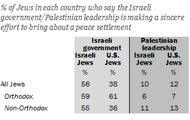
Pew Research Center (March 8, 2016)
Pew Research Center poll shows that Israeli and U.S. Jews have different perspectives on the peace process, settlements, and U.S. support for Israel, as well as different ideas about what is essential to Jewish identity, with U.S. Jews more likely to see ethics and justice as essential to being Jewish. Read More >
Despite Their Wide Differences, Many Israelis and Palestinians Want Bigger Role for Obama in Resolving Conflict
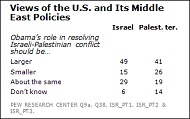
Pew Research Center (May 9, 2013)
Among other findings, shows that majorities of both Israelis and Palestinians both want U.S. President Barack Obama to play a larger role in resolving the Israeli-Palestinian stalemate. Obama enjoys the confidence of 61% of Israelis, up 12 percentage points from 2011. Only 15% of Palestinians express confidence in Obama to do the right thing in world affairs, with 82% saying they have little or no confidence in the American president. Read More >
Sympathies with Israelis or Palestinians; Israeli attack on Gaza justified

CNN / ORC (November 16-18, 2012)
Finds that 59% of Americans say their sympathies lie more with Israel, as opposed to just 13% who say their sympathies are more with the Palestinians. Also shows that 57% of Americans believe Israel justified in "taking military action against Hamas and the Palestinians in the area known as Gaza", while only 25% feel it is unjustified. PDF >
Americans on the Middle East: A Study of American Public Opinion
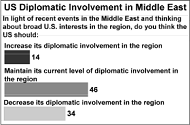
The Anwar Sadat Chair for Peace and Development / The Program on International Policy Attitudes (October 8, 2012)
Among other findings, shows that two-thirds of Americans continue to express the view that the Arab-Israeli conflict is a "top five issue" in regard to its importance to U.S. foreign policy. Also shows that a plurality want the U.S. to maintain its current level of diplomatic activity in the Middle East. PDF >
American Opinions on the Israeli-Palestinian Conflict
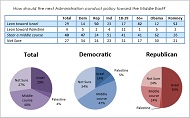
Zogby Research Services / The Arab American Institute (August 2012)
Finds that a plurality of Americans (40%) believe U.S. policy should steer a "middle course" between Israelis and Palestinians. Also finds strong bipartisan support for the idea that Israelis and Palestinians are "equal people entitled to equal rights," with 43% supporting a two-state solution, a shared Jerusalem, the evacuation of most settlements, and a Palestinian right of return to the new Palestinian state. Only 14% oppose such a plan. Read More >
Most Muslim Americans See No Justification for Violence
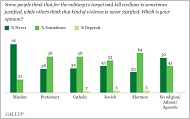
Gallup (November 2011)
Reveals that a large majority of Muslim Americans are most likely (89%) to reject violent attacks by individuals or small groups on civilians versus any other U.S. religious group. Also finds that 81% of Muslim Americans and 78% of Jewish Americans support a future in which an independent Palestinian state would coexist alongside of Israel. Read More >
Growing Majority of Americans Oppose Israel Building Settlements
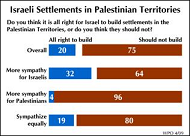
WorldPublicOpinion.org (April 29, 2009)
Finds that three-quarters of Americans think that Israel should not build settlements in the Palestinian territories, including 65% of Republicans and 83% of Democrats. Also shows that 51% express equal levels of sympathy for both Israelis and Palestinians. Read More >
Seeing Eye to Eye: A Survey of Jewish American and Arab American Public Opinion
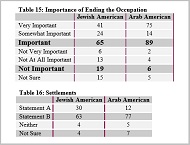
Americans for Peace Now / The Arab American Institute / Zogby International (May 2007)
Survey of 501 Jewish Americans and an equal number of Arab Americans confirming that strong majorities in both communities remain committed to the right of both Israelis and Palestinians to live in secure and independent states; support a negotiated settlement to issues such as Jerusalem, refugees, and borders; and consider a resolution to the conflict in the U.S. national interest. Accordingly, Arab and Jewish American public opinion supports an end to the occupation and a freeze in West Bank settlement construction. Read More >